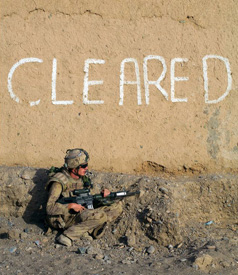“The Afghan National Security Forces should lead and conduct military operations in all provinces by the end of 2014,” says a leaked draft of the communiqué that foreign ministers at the Kabul Conference are expected to sign Tuesday in Afghanistan.
Kabul, Afghanistan – Tuesday’s Kabul Conference may hint at something that the United States and other sponsors of Afghanistan’s government have been dancing around for some time: A target date for ending what is already America’s longest running foreign war.
A draft of the communiqué that US Secretary of State Hillary Clinton and senior ministers from over 40 countries are expected to sign Tuesday was leaked to the British newspaper, The Independent. It says the “international community” supports the notion that “the Afghan National Security Forces should lead and conduct military operations in all provinces by the end of 2014.”
While the language could well be altered or dropped by the end of Tuesday’s conference the draft is a reflection of the growing unease over the war among many members of the NATO coalition in Afghanistan.
German Foreign Minister Guido Westerwelle told reporters on Monday that he supported the 2014 target and that Germany wants a “perspective for a withdrawal” to come out of the conference. UK Defense Secretary Liam Fox told the BBC that his nation’s combat troops will likely be out of the country by then as well.
A Controversial Issue
But the issue of setting a timetable for an international withdrawal from Afghanistan has been a controversial one since President Barack Obama said in his West Point speech last December that he’d like US combat troops to start to withdraw by August of 2011.
Critics lashed out almost immediately then that a timetable gave heart to the Taliban, effectively signaling that they could simply hunker down and outlast the international community.
That’s a position that members of President Hamid Karzai’s government have expressed as well. But the target date of 2014 – which would likely begin, all going well, with the transfer of security control to Afghan authorities In some areas as soon as next year – appears to represent a position that they can live with.
In an interview last week, Afghanistan’s National Security Advisor Rangin Dadfar Spanta said 2014 was a realistic date for the country to take over responsibility for its own security and said it was likely the international force would be cut down to just trainers that year.
Why Talk of a Drawdown is Now More Palatable
The greater willingness to talk about drawdowns is a reflection of both political reality and improvements in the Afghan National Army.
On the political side is the clear war fatigue of NATO members, and the belief of some that the absence of deadlines has taken the pressure off of Afghan leaders to prepare to look after their own security.
The Dutch are pulling out their combat troops by the end of the year, the Canadians are leaving next summer, and the war is increasingly unpopular in Germany and the UK, two of the largest contributors to the war effort after the US.
On the military side, US officers say the Afghan National Army has made great strides since international forces revamped their training efforts here in 2009. Afghanistan is expected to announce at the conference that it’s reached the target size for the army of 134,000 trained men about two months ahead of schedule.
While desertions, illiteracy, and drug use among recruits and corruption in the officer corps remain problems, members of the training mission say the quality of soldiers coming out of basic training today is dramatically higher than it was even six months ago.
That’s one reason that Afghanistan’s Ministry of Defense and Interior have been working on a phased plan for territorial control to be shifted to Afghan forces.
“Great work has been done in building the Afghan National Army,” says Waliullah Rahmani at the Kabul Center for Strategic Studies. “The work has only really just started, but real progress in that area is being made.”
Join us in defending the truth before it’s too late
The future of independent journalism is uncertain, and the consequences of losing it are too grave to ignore. To ensure Truthout remains safe, strong, and free, we need to raise $46,000 in the next 7 days. Every dollar raised goes directly toward the costs of producing news you can trust.
Please give what you can — because by supporting us with a tax-deductible donation, you’re not just preserving a source of news, you’re helping to safeguard what’s left of our democracy.
